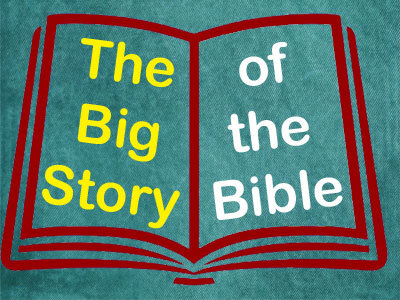
436K
Downloads
3363
Episodes
G’day and welcome to Partakers Christian Podcasts! Join us for uplifting Bible teaching, inspiring readings, heartfelt worship, powerful prayers, and fascinating church history. Whether you’re new to faith or growing deeper in your journey, we’re here to encourage and equip you. 🎧 Tune in, interact, and be inspired—wherever you are in the world.
G’day and welcome to Partakers Christian Podcasts! Join us for uplifting Bible teaching, inspiring readings, heartfelt worship, powerful prayers, and fascinating church history. Whether you’re new to faith or growing deeper in your journey, we’re here to encourage and equip you. 🎧 Tune in, interact, and be inspired—wherever you are in the world.
Episodes

Thursday Nov 16, 2023
The Big Story - Part 6
Thursday Nov 16, 2023
Thursday Nov 16, 2023

Big Story - Act 4 Scene 1: The life of Jesus
with Roger Kirby
Of course we are now approaching the climax of the Biblical story: the life, death and resurrection of Jesus. But there is a curiosity here. The ancient creeds of the Christian church say things like: … born of the Virgin Mary, suffered under Pontius Pilate … without a word about his life in between. We, too, give a great deal of attention to Christmas and Easter, but probably not so much to his life in between. Yet, at a rough count, there are only 4 chapters in total in the 4 Gospels about his birth, 14 about his death, but no less than 73 about his life in between. What, in our excitement about his birth as a human being, the incarnation, and his death, for our salvation, are we missing?
The stories all 4 gospel writers tell concentrate on 3 things: first that Jesus was the long expected Messiah and secondly and closely associated with that that the Kingdom of God had arrived, and thirdly that this Messiah and this Kingdom are not as expected but modest, humble, quiet and suffering and therefore, very surprisingly, are the nature of God himself. Jesus clearly knew that it was of fundamental importance that these facts should be seen and understood by the people amongst whom he lived and taught before his death on the Cross.
First then: the Messiah and his Kingdom. These things interlock so tightly it is impossible to talk about them separately. They go together. These days we are very familiar with the power of the urge people have to be governed by their own people even if that government is not very good. Most of the wars we hear about in the world today are caused by a small group of people wanting to break away from a larger group and be their own masters and them to impose their ideas and their control on other people. It was just the same 2000 years ago. Rome was in control and although this meant that most of their world was peaceful the Jewish people were not at all happy with the situation. Their ancient scriptures seemed to suggest that things would be quite different. Psalm 89 says: “I will sing of the Lord ’s great love forever; with my mouth I will make your faithfulness known through all generations. I will declare that your love stands firm forever, that you have established your faithfulness in heaven itself. You said, “I have made a covenant with my chosen one, I have sworn to David my servant, ‘I will establish your line forever and make your throne firm through all generations. … I will maintain my love to him forever, and my covenant with him will never fail. I will establish his line forever, his throne as long as the heavens endure.”
The Jews of Jesus’ time might well ask how did what was happening fit into that? And they did ask, many times and in many ways and could not understand it. It was David’s heirs who were supposed to rule over the Lord’s people, not the Romans and their puppet kings who were actually doing so. In particular there was to be one man, David’s heir, the Lord’s anointed, the Messiah who was to lead the people of God. Where was he?
Then there is the prophecy of Daniel: “In my vision at night I looked, and there before me was one like a son of man, coming with the clouds of heaven. He approached the Ancient of Days and was led into his presence. He was given authority, glory and sovereign power; all nations and peoples of every language worshipped him. His dominion is an everlasting dominion that will not pass away, and his kingdom is one that will never be destroyed.” He was to rule not just Israel but all nations. Why was that not happening?
John the Baptist was put in prison and from there he asked a very specific question of Jesus: “Are you the one who is to come, or should we expect someone else?” by which he clearly meant are you the Messiah, David’s heir of the Psalms, the son of God of Daniel, or not?
Jesus replied in words that closely followed the statements of Isaiah chapters 35 and 61, “Go back and report to John what you hear and see: The blind receive sight, the lame walk, those who have leprosy are cleansed, the deaf hear, the dead are raised, and the good news is proclaimed to the poor. That was a very loud and clear ‘yes, I am the Messiah’.
Then again in John chapter 2 we read that Jesus said: “Destroy this temple, and I will raise it again in three days.” John explains that the temple he had spoken of was his body. So Jesus was saying that he was the replacement temple, the new place where God was specially present.
We saw in our last scene from the Old Testament that the temple was the dwelling place of God and that in any spiritual sense it had been completely removed from the building in Jerusalem. Only now is it back again in the person of Jesus. Jesus called himself “I AM” on some 14 occasions according to John. Seven times this was with another word such as ‘I am the bread of life’, but on another 7 occasions he said ‘I AM’ with no other word (usually translated I am he) thus using the Old Testament word for God. He could not have made who he was clearer.
If he was the Messiah that meant his kingdom had arrived. Matthew tells us Jesus said, “Repent, for the kingdom of heaven has come near” and proclaimed the good news of the kingdom. And, of course, he framed many of his parables with ‘the kingdom is like … ‘. Understanding of what Jesus was saying is a surprisingly modern thing. Not so very long ago there were arguments between those who thought the kingdom was what the church was doing and those who thought it referred mainly to what would happen when Jesus returned in glory. It is now clearly understood that he inaugurated his kingdom during his lifetime, that it is still here, but has not yet become clear to all the world because it is not yet here in all its eventual glory. That is summed up in the phrase ‘now, but not yet’ which is implicit in the prayer Jesus taught his disciples: ‘your kingdom come, your will be done, on earth as it is in heaven.’ Understanding and holding that tension is enormously important for all of us who seek to follow Jesus.
In seeing that the Kingdom has been established by Jesus during his lifetime we have also seen that beyond any doubt he was the Messiah. And so we come to the third point: the Kingdom was not what was expected then or even what many people, even today, think it should be like.
It starts with the story of a baby, a baby because of whom all the other male babies in the immediate area were killed. He was surrounded by suffering before he could say a word! Then he was a refugee in Egypt for several years. He lived in obscurity for 30 years. When he finally started to speak publically he was identified as Mary’ son and the brother of James, Joseph, Simon and Judas, or Joseph’s son, not as himself. Before long he had to go up to the great festivals in Jerusalem quietly, secretly, because of the authorities.
Then, of course, he had to suffer the terrible pain and horrible indignities of crucifixion. All those things that happened to him fitted well with the great prophecy of Isaiah in chapter 53, “He was despised and rejected by mankind, a man of suffering, and familiar with pain. Like one from whom people hide their faces he was despised, and we held him in low esteem. Surely he took up our pain and bore our suffering, yet we considered him punished by God, stricken by him, and afflicted. But he was pierced for our transgressions, he was crushed for our iniquities; the punishment that brought us peace was on him.”
In all that suffering he was the King of Love. He introduced into the world a much more positive idea that people should look after each other, care for the weak and struggling, be compassionate, than there had ever been before.
He was the Messiah; he had founded his Kingdom, the Kingdom of God; it was not at all like the Kingdom they expected and wanted.
So what?
To put it in a phrase: ‘the way up is down’. It was for Jesus. It may well be for us. He said, “In this world you will have trouble. But take heart! I have overcome the world.” In saying that he showed how complete was his understanding of human nature. It is an amazing thing that Christians, dedicated to love and peace, should be so attacked and mistreated all round the world. To be sure there have been episodes in church history where the antagonism has been merited but the general trend of church history has been for peace and love. One might wonder what the world would be like if Jesus had never lived, never taught, never set his great example of how to bear suffering.
Paul understood very well the implications of setting out to follow Jesus as Lord and Master. . He said, “I want to know Christ—yes, to know the power of his resurrection and participation in his sufferings, becoming like him in his death”.
Peter said, “Dear friends, do not be surprised at the fiery ordeal that has come on you to test you, as though something strange were happening to you. But rejoice inasmuch as you participate in the sufferings of Christ, so that you may be overjoyed when his glory is revealed. If you are insulted because of the name of Christ, you are blessed, for the Spirit of glory and of God rests on you.”
All this is a hard thing to understand, hard to believe that this is really the way that it is – particularly if you live in one of the parts of the world where open persecution is not known or minimal. If however you are not so fortunate and live somewhere where it is really tough to be a Christian I think you will understand what Jesus, Paul and Peter meant very much better, and, if not exactly glorying in your difficulties, understanding that they are what strengthen and toughen the Christian and the church.
In the eyes of the world these things are down and to be avoided at any cost, but in the Kingdom of our great Lord and Saviour “ the way up is down”!

No comments yet. Be the first to say something!